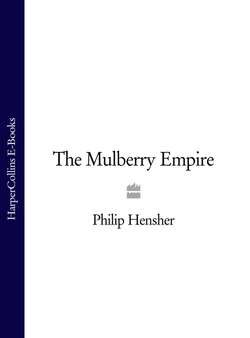Читать книгу The Mulberry Empire - Philip Hensher - Страница 23
6.
ОглавлениеThrough these evenings, these festive London gatherings, people move without any will, like balls on a billiard table. At one end of the space, new balls spill into the confined space, and at the far end, the balls drifting around the smooth space prod each other and drift off unpredictably. An announcement at the door, a pair of new arrivals, somehow nudges the room along a little, and the mass, unwilled, cannons through the room, and the last ripple brings Burnes to his feet, and face to face with Stokes, a brilliant and brilliantly polished writer for the journals, his head smooth and gleaming like marble, his glittering spectacles always ready to be whisked off to make a point. They greet each other, silently.
‘I understand, Mr Burnes, that you have been signally honoured,’ Stokes begins.
‘Beyond my desserts, no doubt, sir,’ Burnes says.
‘I heard that you were signally honoured,’ Stokes persists. ‘By our friend in Brighton.’
‘I would hardly call the King my friend,’ Burnes says. Or yours, he seems to insist.
‘That must have been a thrilling occasion, sir,’ Stokes said.
‘If I were, indeed, honoured by the King’s curiosity in my explorations,’ Burnes says, ‘you could hardly expect me to tell you the purport of the conversation.’
‘Come, come, Burnes,’ Stokes says. ‘I meant no affront. I did not think it was so very secret. It was from the – no, better not to say – but it was from a gentleman of the Court that I heard the interesting fact. Would you prefer to find some more quiet place to talk?’
‘No, sir,’ Burnes said. ‘I can have nothing to say to you that I would keep from any person here present. I was honoured by the King’s interest, who had read my book with the greatest curiosity, and I received the King’s gracious command to Brighton. That is all. A trivial meeting, made remarkable only by the King’s majesty. There is really nothing more to say.’
(He resists the recall of the jovial bulging maggot in silk stockings and a scrubby wig, thumping the floor with his stick, his nervous Queen clutching the gilt sides of the chair, underneath the vast grand mouldings and velvet and gilt, what passed in his late brother’s mind for an oriental palace, and asking such blunt ordinary wrong questions it was not in him to know how to respond, to offer any kind of satisfaction.)
‘Your reticence does you credit, sir,’ Stokes says. ‘I have read your book, and greatly admire it. You exhibit the greatest faculties of curiosity, erudition and exposition. But I reached the end of your book with one burning question, ah, as it were, unextinguished. What in heaven’s name are we doing in Afghanistan? What, come to that, are we doing in India?’
‘Sir, I hardly know what you can mean.’
‘My meaning is this,’ Stokes continues. ‘What drove us to acquire our oriental possessions? And what is driving us to acquire still more? I presume, sir, that you were not in Kabul in pure curiosity. I presume, in short, that your mission was conducted to the sound of those siren voices enjoining us to occupy the whole of Asia, and bankrupt our children and our children’s children and our children’s children’s children. There can be no doubt that you were there to prepare for us to acquire the Punjab, to repeople Afghanistan with our sons and daughters, and open up yet another bottomless pit, to swallow our limited resources – resources which could be put to better use two miles from this house, to clothe and feed the filthy urchins who will beg a farthing from you, and from me, the second we leave our so agreeable hostess’s embrace this evening. What, sir, in heaven’s name, are we doing in India?’
‘You are quite wrong, Mr Stokes,’ Burnes says. This is a familiar argument; he has had it, indeed, with Stokes on previous occasions. ‘There is no intention to add the Punjab or the western tracts of land to our possessions. My mission was purely geographical, purely driven by curiosity. But what, sir, would be the alternative you propose? Were we to stay at home and do nothing?’
‘And why not? What is so wrong with being satisfied with what you have?’
‘Nothing, sir, unless you have the spirit of a Briton. Our possessions, sir, are vast new markets. Do you suppose our little island can contain our native spirit? Of course it cannot. And should we stay at home, relinquish India tomorrow, what would happen? Would the natives not slide back into all manner of native barbarities – the murder of travellers, the forced suicide of widows? Thuggee and suttee? Would the precious flame of Christianity survive six months in such a poisoned atmosphere? Would India, indeed, be left to its own devices? Would not the French perceive an empty space? Would not Russia send its vast armies to bring new barbarities to a barbarous land? Sir, I suspect you of the worst sort of cynicism.’
‘Perhaps,’ Stokes says, smiling, maddeningly, like a teacher praising a moderately bright pupil. ‘I admire your spirit, Mr Burnes – I who have never travelled so far as to see the ocean.’
Burnes bows, deeply, coldly; he is oddly irritated by the conversation.
